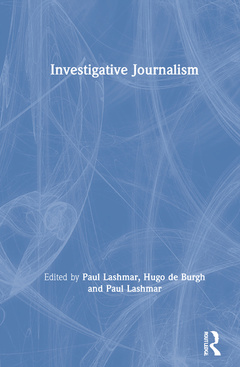Investigative Journalism (3rd Ed.)
Coordonnateurs : de Burgh Hugo, Lashmar Paul

This third edition maps the new world of investigative journalism, where technology and globalisation have connected and energised journalists, whistle-blowers and the latest players, with far-reaching consequences for politics and business worldwide.
In this new edition, expert contributors demonstrate how crowdsourcing, big data, globalisation of information, and changes in media ownership and funding have escalated the impact of investigative journalists. The book includes case studies of investigative journalism from around the world, including the exposure of EU corruption, the destruction of the Malaysian environment, and investigations in China, Poland and Turkey. From Ibero-America to Nigeria, India to the Arab world, investigative journalists intensify their countries? evolution by inquisition and revelation.
This new edition reveals how investigative journalism has gone digital and global. Investigative Journalism is essential for all those intending to master global politics, international relations, media and justice in the 21st century.
Notes on contributors
Acknowledgements
Introduction
HUGO de BURGH
PART I Context
Chapter One: Data journalism in a time of epic data leaks
HAMISH BOLAND-RUDDER & WILL FITZGIBBON
Chapter Two: National security
PAUL LASHMAR
Chapter Three: New models of funding and executing
GLENDA COOPER
Chapter Four: Digital sleuthing
FÉLIM MCMAHON
Chapter Five: Kill one and a dozen return
STEPHEN GREY
Chapter Six: Legal threats in the UK
SARAH KAVANAGH
Chapter Seven: Mission-driven journalism
RACHEL OLDROYD
Chapter Eight: Grassroots operations
RACHEL HAMADA
Part II Places
Chapter Nine: China and the digital era
WANG HAIYAN & FAN JICHEN
Chapter Ten: Syria: the war and before
SABA BEBAWI
Chapter Eleven: Survival in Turkey
SELIN BUCAK
Chapter Twelve: Poland since 1989
MAREK PALCZEWSKI
Chapter Thirteen: India’s paradox
PRASUN SONWALKAR
Chapter Fourteen: Malaysia: a case study in global corruption
CLARE REWCASTLE BROWN
Chapter Fifteen: Ten years in Nigeria
EMEKA UMEIJI & SULEIMAN A. SULEIMAN
Chapter Sixteen: The European Union and the rise of collaboration
BRIGITTE ALFTER
Chapter Seventeen: Ibero-America surveyed
MAGDALENA SALDAÑA & SILVIO WAISBORD
Chapter Eighteen: How the United Kingdom’s tabloids go about it
ROY GREENSLADE
Chapter Nineteen: The United Kingdom: reporting of the far-right
PAUL JACKSON
Chapter Twenty: The United Kingdom’s Private Eye: the ‘club’ the powerful fear
PATRICK WARD
Afterword: A manifesto for investigative journalism in the 21st century
PAUL LASHMAR
Index
Hugo de Burgh is Professor of Journalism at the University of Westminster, where he set up the China Media Centre in 2005. He is also Professor in the School of Media & Communications at Tsinghua University. Previously he worked for Scottish Television, the BBC and (the UK’s) Channel 4. Recent books include China’s Media Go Global (2018, with Daya Thussu and Shi Anbin) and China’s Media in the Emerging World Order, Second Edition (2020). Previous publications include Investigative Journalism (three editions); Democracy in England: Possible & Necessary; The Chinese Journalist; Making Journalists; China, Friend or Foe?; China’s Environment and Chinese Environment Journalists; China and Britain: The Potential Impact of China’s Development; Facing Western Media 应 对西方媒体; The West You Really Don’t Know 你所不了解的西方故事 and Can the Prizes Still Glitter? The Future of British Universities in a Changing World.
Paul Lashmar is Head of the Department of Journalism at City University of London as well as Reader in the Department of Journalism. He has written extensively about the world of intelligence agencies for four decades. His research interests include investigative journalism, intelligence–media relations and organised crime. Lashmar has been an investigative journalist in television and print and on the staff of The Observer, Granada Television’s World in Action current affairs series and The Independent. Books authored or co-authored by him include Online Journalism: The Essential Guide (2014, with Steve Hill). Spies, Spin and the Fourth Estate was published in September 2020.
Date de parution : 03-2021
15.6x23.4 cm
Date de parution : 03-2021
15.6x23.4 cm
Thèmes d’Investigative Journalism :
Mots-clés :
Data Journalism; Investigative Journalism; Lone Actor Terrorism; Lava Jato; whistle-blowers; Panama Papers; Hacking scandal; NUJ’s Code; data protection; NUJ Member; national security; Investigative Journalist; Bellingcat; Fed Back; data leaks; UN; International cooperation; Legacy News Organisations; FOIs; Investigative Reporting; Democratic deficit; Public Interest Journalism; wartime investigations; Undercover Footage; NGOs; Investigative Stories; Fake news; Team Approach; China; NSA; Violated; Malaysian environment; ISIS Video; Master global politics; EU Fund; Globalisation; Daphne Project; International relations; Syrian Journalists; Anti-press Violence; Covert CIA Operation; Private Tv Channel



